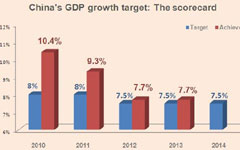Waiting game for action on economic solutions
By Ed Zhang (China Daily) Updated: 2014-03-24 07:34Their observations are not only important for forecasting China's long-term performance; investors had better keep them in mind and compare them with the short-term realities across various industrial sectors. Opportunities, if defined as meaningful growth, can only come along where bankruptcies are reported, old funds allowed to default or collapse, large companies break up, small companies multiply and rules are remade to allow new services to reach out to young customers.
|
 |
When the government doles out an investment stimulus or consumer incentives, the stock market may respond favorably, but just for a short period, because they are unlikely to generate steady growth.
So we can look forward to an uneventful first quarter, and perhaps the next, when many local governments remain disorganized over their funds and unfinished projects, and when only some large State-owned corporations begin to talk about their plans to work together with private capital to build subsidiaries with mixed ownership.
Important projects, such as the pilot free trade zone in Shanghai, or the urban cluster covering Beijing, Tianjin and Hebei, are yet to generate tangible results or any innovation in the government's service to society and the business community.
The only truly area of robust business is the mobile Internet service, where real money, not just ideas and plans, is flowing and making an impact.
Even the central bank's ban on virtual credit cards on security grounds can be expected to be made obsolete when more sophisticated solutions are developed.
The author is editor-at-large of China Daily.
- NHTSA says finds no 'defect trend' in Tesla Model S sedans
- WTO rare earth ruling is unfair
- Amway says 2014 China sales may grow 8%
- President Xi in Europe: Forging deals, boosting business
- CNOOC releases 2013 sustainability report
- Local production by Chery Jaguar Land Rover this year
- Car lovers test their need for speed in BMW Mission 3
- China stocks close mixed Monday

















